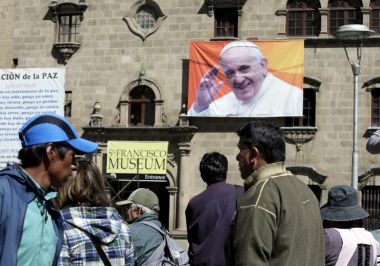Pope Francis to speak about 'protection of creation' in July 5-12 Latin America visit

Pope Francis is set to return to his home continent on Sunday on a hectic seven-day apostolic visit to Latin America's peripheries: Ecuador, Bolivia, and Paraguay, with the pontiff expected to speak about the "protection of creation" and social justice.
The head of the Roman Catholic Church will only stay for 48 hours in each country and deliver 22 addresses. He will also hold five Masses in public parks, military bases, and Marian shrines, Aleteia reported.
The Pope will speak only in his native Spanish during his July 5-12 visit themed "The Joy of Proclaiming the Gospel," which assures a week of impromptu remarks.
"Prepare yourself spiritually for the Pope's interventions," Vatican spokesman Fr. Federico Lombardi, SJ. joked with the media during a conference on Thursday.
According to Vatican Secretary of State, Cardinal Pietro Parolin, the Pope will clearly call for "a protection of creation, our common home; social justice; a peace that respects of the rights of all; a society that is more inclusive of the poor; and a fight against extreme forms of poverty, so that the dignity of every human person may be recognised."
He will also ask for "the cultural identity of each nation to be respected, amid globalising tendencies to make everything the same."
"The Church continues to exercise a prophetic role in the face of what the Pope calls 'ideological colonisation,' i.e. attempts to impose models that not only not suitable to the ethos and traditions of the population, but many times even tend to subvert them," said Parolin.
During his meeting with families in Manila, Philippines, in January this year, the Pope asked the clergy and laity to "be on guard against colonisation by new ideologies," which includes mounting efforts to redefine marriage.
"There are forms of ideological colonisation which are out to destroy the family," the Pope said offhand. "They are not born of dreams, prayers, closeness to God, or the mission which God has given us. They come from without, and for that reason I am saying that they are forms of colonisation."
One of the contentious issues where the Pope has taken a firm stand against is "gender theory," which he described as a "threat to society" and is progressively being imposed in Latin America.
On the Feast of Our Lady of Guadalupe last year, Pope Francis quoted his predecessor, Pope John Paul II, who called Latin America a "continent of hope."
The Pope said the continent's people are being exploited and are rejected "by the idolatrous system of a throwaway culture," adding: "we expect new models of development, which link reconciliation, scientific and technological development to human wisdom, fruitful suffering to hopeful joy."
On Monday, the Pope asked for prayers for his journey to the continent, saying: "I ask you all to accompany me with prayer, that the Lord will bless my journey on the continent of Latin America so dear to me, as you can imagine."
The Pope will possibly find less hostile environments among leftist and populist leaders in Ecuador and Bolivia than his conservative German forerunner, according to Jimmy Burns, a papal biographer.
"Before Francis came on the scene, the populist governments were on a collision course with Catholic church. With Francis, both Evo Morales [of Bolivia] and Rafael Correa [of Ecuador] have been forced to reach out to the Catholic church and make amends, so the church will find a less conflicting environment than Benedict might have found," he said.
The Pope has skipped a visit to his home country Argentina to avoid being seen as "playing favourites" and to emphasise his interest in highlighting the plight of the poor, The Guardian reported.
He also clarified at the start of his papacy that he will steer clear of Argentina until after the successor of current President Cristina Fernández de Kirchner is elected in October.
Fernandez, who will step down on Dec. 10, had an icy relationship with the pontiff that worsened when Fernandez green-lit a law legalising same-sex marriage in Argentina in 2010.
Relations between the two have seemingly thawed as Fernandez, who said she would run for the post of a popess if there was one, has frequently visited the Vatican.
"I have to say that sometimes I feel used by the politics of my country, by Argentinian politicians seeking audiences," the Pope said in an interview with a Mexican television channel in March.











